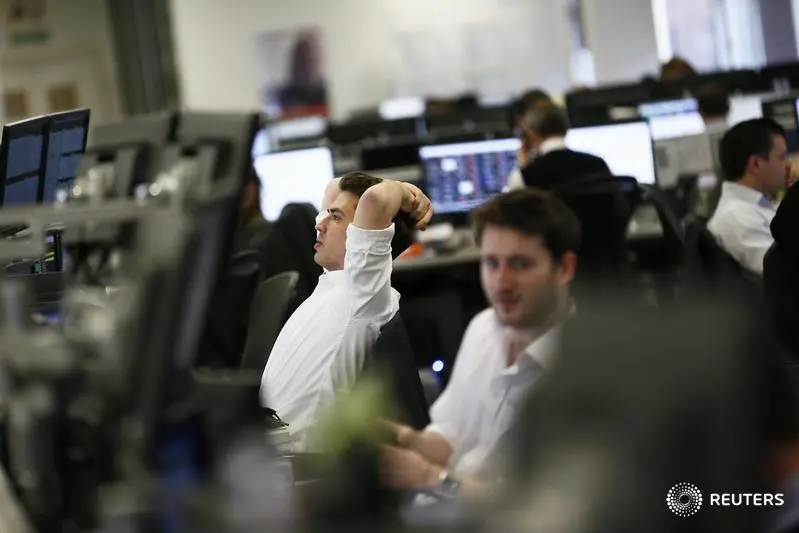PHOTO
Major European equity markets were lower on Thursday after a raft of corporate earnings in the U.S. and Europe, while a rate cut in the UK and prospects of upcoming policy easing in the United States boosted global bonds.
The Federal Reserve held interest rates steady on Wednesday but opened the door to a cut in September. The Bank of England stole a march on the Fed on Thursday by lowering borrowing costs by a quarter-point in a narrow 5-4 vote.
Major European markets were mostly lower with the pan-European STOXX 600 down 0.3%, and Germany's DAX and France's CAC 40 both nursing losses of over 0.9%.
"The fact that some heavyweights are cutting guidance does not bode well going forward and might well explain why European markets are underperforming," said Stephane Ekolo, equity strategist at TFS Derivatives.
"Disappointing set of results, slowing growth for industrials, Chinese consumers no longer there to rescue demand and a possible resurgence of inflation. You have a not so pleasant cocktail."
Britain's FTSE 100 bucked the trend, benefitting from a weaker pound after the BoE's rate cut. The more domestic-orientated FTSE 250 rose 0.7% to its highest since Feb. 2022.
"If you look at the headlines that Bailey produced: caution on cutting too quickly or by too much, it implies to me that they're looking at a steady quarterly pace of reductions," said Colin Asher, economist at Mizuho.
"I would say that makes a cut in the next meeting in September unlikely. The start of lower interest rates is underway, but reasonably gradually."
Nasdaq futures gained 0.6% as shares of Facebook-parent Meta Platforms surged 7% pre-market on strong earnings. The index rose 3% on Wednesday, while the S&P 500 climbed 1.6%.
U.S. tech stocks have made an extraordinary comeback after the recent sell-off. AI darling Nvidia rallied 13% on Wednesday, adding about $330 billion in stock market value.
Tech giants Apple and Amazon.com will report their earnings later on Thursday.
MSCI's broadest index of Asia-Pacific shares outside Japan climbed 0.5%, after ending July mostly flat. A regional MSCI IT index jumped 1.7% and Taiwan's shares surged 2%.
Japan's Nikkei, however, tumbled 2.5% as a sharp jump in the yen clouded the outlook for exporters.
The Japanese yen rallied to as much as 148.51 per dollar its strongest level since March 15, a day after the Bank of Japan raised interest rates for the second time in 17 years and signalled more tightening to come.
It was last down 0.3% at 150.35.
FED SIGNALS SEPTEMBER CUT
Eyes remained on the U.S. monetary policy outlook after Fed Chair Jerome Powell said policymakers had a "real discussion" about cutting at the July meeting.
The central bank also said the risks to employment were now on a par with those of rising prices.
As a result, markets - which have already bet on a September cut - are wagering on a 10% chance that the Fed may go for a 50 basis points easing in September. For all of 2024, they have priced in a total easing of 72 basis points.
"The statement was notable in that they removed the tightening bias and replaced it with a more neutral bias," said Jan von Gerich, chief analyst at Nordea.
"It's early but the fact we haven't really seen the rally continue suggests that markets may be trying to catch some breath before tomorrow's payrolls report."
Treasuries extended their gains from Wednesday with the yield on 10-year Treasuries down 5 basis points to 4.0564%, having dropped as much as 11 bps the day before to the lowest since March, before ending lower by 3.5 bps. Yields move inversely to prices.
After falling 0.4% on Wednesday, the dollar index rebounded 0.3%, with the euro down 0.4%. Sterling dropped 0.6% after the BoE's rate cut.
In commodity markets, oil prices extended their surge after the killing of a Hamas leader in Iran raised the threat of a wider Middle East conflict.
Brent crude futures rose 0.9% to $81.53 per barrel, while U.S. West Texas Intermediate crude futures increased 0.9% to $78.62 per barrel.
Brent jumped about 2.3%, while U.S. crude rose over 4% in the previous session.
Gold was down 0.5% at $2,436 an ounce.
(Reporting by Samuel Indyk, Stella Qiu and Ankur Banerjee; Editing by Miral Fahmy, Christina Fincher and Chizu Nomiyama)




















